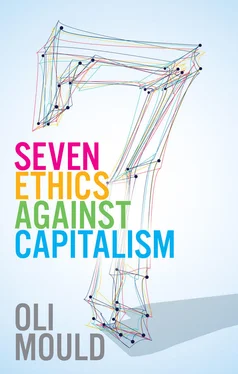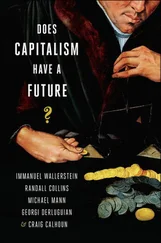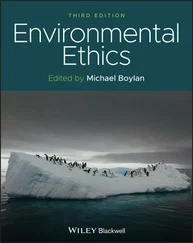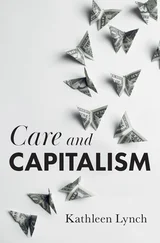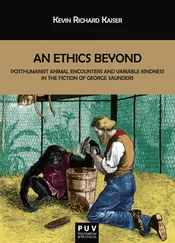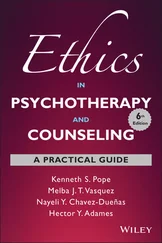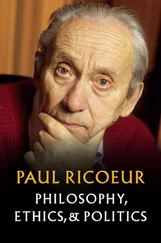As discussed above, thinking the commons as planetary entails thinking them ethically, in that they are always immanent and unfolding; they are always in a state of becoming the commons in conjunction with a community; the act of commoning. Indeed, Gibson-Graham, with their articulation of commoning, invoke a Deleuzo-Guattarian reading of becoming, arguing that it aids in producing a ‘generative ontological centripetal force working against the pull of essence or identity’. 28
Therefore, I want to build on this lineage of thinking ethically that refuses totalizing predetermined forces that can restrain difference, and instead embrace the variance that exists in the world in any given situation, in any given time, in any given place. The ethics I want to outline, then, are first and foremost grounded in this ontology; they are ‘soft’ articulations. They are articulations in that they can be communicated (i.e. via this book) and they are soft because they are malleable, porous and transmutable (i.e. they are necessarily ‘open-source’ – they can be used, adapted and transmogrified). They are behavioural and emotional ‘patterns’ that are constantly in flux, rather than rigid templates to adopt.
What is important to factor into this discussion, however, is that the actualization of this reading of ethics is always related to an event . The ethics are not predetermined or imposed; an event always happens first. In other words, for ethics to have a grounding or indeed something to be ethical towards (other than complete nihilism), they are tethered to, and unfold from, a pre-existing ‘event’. As Deleuze has argued, ‘ethics is concerned with the event; it consists of willing the event as such, that is, of willing that which occurs insofar as it does occur’. 29But just want do we mean when we say ‘an event’?
An event is when something happens that is so extraordinary that it changes the entire way everything – society, politics, economics human and nonhuman behaviour – is. More than that, though, an event is creative . It brings into existence entire ways of being in the world that simply did not exist beforehand. Some of these exist only as possibilities, or possible possibilities. An event emerges unexpectedly as the ‘old’ world ruptures, bringing new subjects, new truths and radically different experiences into existence, and shifts how that world works in its entirety. Deleuze would argue that events are ‘eruptions’ within a collective that calls for its complete transformation; in his words, they ‘overthrow worlds’. 30
But such ruptures happen often. What makes an event an event is what happens after. How people react to the event maintains its ‘eventfulness’. The radical change that an event brings upon the world happens through the actions of the people, communities, institutions and things that are compelled to advocate and affirm the newness that the rupture has exposed to the world. It becomes a cause to fight for, something to believe in, a truth that must be defended.
There are many revolutionary episodes throughout modern history that have been revered as exemplar events: the Paris Commune, the Russian Revolution, the Chinese Cultural Revolution, the 1968 uprisings in Paris and, more recently, the Arab Spring. 31Events are indeed revolutionary (rather than evolutionary) precisely because they change the whole makeup – governance, behaviour, attitudes and politics – of society. The ‘new’ things that an event creates, then, are new voices for those whose voices have been silenced, hope for those whose hope has been oppressed, and opportunities for those made destitute. Events therefore are radical acts that bring new forms of justice into what is an unjust world.
Yet there are some ‘ruptures’ in the world that may have equally devastating effects, but are not events. For example, while 9/11 was a catastrophic, unexpected event (at least outside of the small group of terrorists who perpetrated it) and instilled shock and terror on a whole new scale, it served only to shore up existing geopolitical injustices; indeed it catalysed them. It foregrounded a renewed military expansion in the Middle East, and justified invasions that were more about securing oil production than bringing down dictatorial regimes. It ossified American imperialism in both geopolitical and economic terms. Crucially, then, an event cannot be known in advance, and it is only thought of as such retrospectively. And make no mistake; we are potentially living through what we may eventually conceptualize as an event.
In the wake of the coronavirus pandemic of 2020, the relatively smooth functioning of contemporary capitalism has severely ruptured. In the process, many different ‘realities’ are coming to the fore. First and foremost, we have seen the increased prominence of distinctly state-led programmes of emergency response that have gone against the grain of the capitalist policies that characterized governance structures pre-pandemic. Socialist-leaning policies have been imposed, such as universal basic income (which has been implemented to varying degrees in Spain, Germany and the UK), the rapid acceleration of the greening of our urban spaces, the championing of nationalized infrastructure programmes such as broadband internet for all, and, most importantly, the massive swelling and pedestalling of nationalized healthcare. Debt has been cancelled, and reparations to the global south have been forwarded. Also, we have witnessed the swift rebuttal of the unjust characteristics of corporate capitalism; for example, the clamour for the super-rich not only to pay their fair share of their staff’s wages as they all had to go on furlough, but also to pay more tax in general. (This has been a long-standing demand, and has gained substantial traction in mainstream narratives and political discourses.) 32The failure of just-in-time production to cater for emergency food provision in supermarkets across the UK led to food shortages. These shortcomings were then redressed by the explosion of mutual aid programmes, which also occurred across Europe and the US. 33Street homelessness in the UK was reduced to nearly zero in the space of two weeks as those on the streets were hurriedly given shelter in empty hotels and hostels (this after years of different governments trying and failing to reduce homelessness via various different housing policies). This surge of progressive and common politics evoked communist and anarchist tendencies that are bringing to life revolutionary paradigms of societal organization that are being championed as real alternatives to the capitalist system. As the novelist Arundhati Roy wrote (in the Financial Times of all places), the pandemic is a
portal, a gateway between one world and the next. We can choose to walk through it, dragging the carcasses of our prejudice and hatred, our avarice, our data banks and dead ideas, our dead rivers and smoky skies behind us. Or we can walk through lightly, with little luggage, ready to imagine another world. 34
Hence the pandemic could well be an ‘event’ because everything about the current status of the world is rupturing; the horizons of infinite possibilities are opening up. The virus supposedly came from capital’s continual intrusion into the ‘natural world’, 35and cares not if the victims are billionaires, homeless, the president or a prisoner. Viruses are neither dead nor alive; human nor nonhuman. A global pandemic has been foretold for many years, but nothing like this, with its global reach and rupturing force on the contemporary socio-economic fabric, has been felt before. As such, there has been an outpouring of empathetic responses, mutual aid networks, community action, the denouncement of anti-immigrant sentiments and a broader questioning of what was previously seen as the immutable status quo of capitalist realism; indeed, the activist Rebecca Solnit wrote that ‘the impossible has already happened’ 36and that for the first time in a generation, we can begin to hope for a life beyond the injustices of capitalism.
Читать дальше
